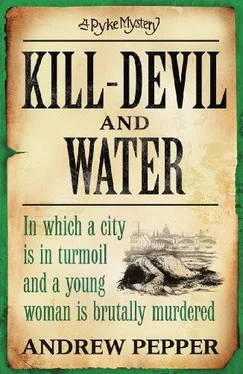Andrew Pepper - Kill-Devil and Water
Здесь есть возможность читать онлайн «Andrew Pepper - Kill-Devil and Water» весь текст электронной книги совершенно бесплатно (целиком полную версию без сокращений). В некоторых случаях можно слушать аудио, скачать через торрент в формате fb2 и присутствует краткое содержание. Жанр: Исторический детектив, на английском языке. Описание произведения, (предисловие) а так же отзывы посетителей доступны на портале библиотеки ЛибКат.
- Название:Kill-Devil and Water
- Автор:
- Жанр:
- Год:неизвестен
- ISBN:нет данных
- Рейтинг книги:3 / 5. Голосов: 1
-
Избранное:Добавить в избранное
- Отзывы:
-
Ваша оценка:
- 60
- 1
- 2
- 3
- 4
- 5
Kill-Devil and Water: краткое содержание, описание и аннотация
Предлагаем к чтению аннотацию, описание, краткое содержание или предисловие (зависит от того, что написал сам автор книги «Kill-Devil and Water»). Если вы не нашли необходимую информацию о книге — напишите в комментариях, мы постараемся отыскать её.
Kill-Devil and Water — читать онлайн бесплатно полную книгу (весь текст) целиком
Ниже представлен текст книги, разбитый по страницам. Система сохранения места последней прочитанной страницы, позволяет с удобством читать онлайн бесплатно книгу «Kill-Devil and Water», без необходимости каждый раз заново искать на чём Вы остановились. Поставьте закладку, и сможете в любой момент перейти на страницу, на которой закончили чтение.
Интервал:
Закладка:
Pyke thanked him and gave him the name of Mrs McAlister’s guest house; Harper had promised to furnish Pyke’s suitcase with apparel appropriate for a West Indian planter.
Malvern stood, hands on hips, muttering ‘Very good’ over and over to himself. He was a slight, insubstantial man with hunched shoulders, pinched cheeks and a pale, almost ghostly complexion. He had very little presence or charisma, and Pyke wondered about his dealings with Pemberton — which one of them really made the decisions. But the most remarkable thing about him was his lips, which were plump and almost purple in colour, as though he’d just eaten a bowlful of ripe blackberries. If Pyke had passed him in the street, he wouldn’t have paid him any attention, and Pyke wondered just how much of a disappointment he’d been to the father and grandfather who between them, according to Harper, had built the Ginger Hill estate into what it was.
The details regarding the Malvern family dynasty which Harper had furnished him with were, at best, sketchy. Pyke knew that Charles Malvern’s grandfather, Amos, had arrived on the island some time in the early 1770s, penniless but ambitious, but he had little idea how the man had risen from the position of bookkeeper and overseer to plantation owner in just a few years. According to Harper, Amos Malvern had been a cruel and greedy man; someone capable of doing whatever was necessary in order to further his own position. Amos found that the title of planter suited him and, although he didn’t have a particularly acute business mind, in those days it was difficult not to make money. Slaves from Africa were cheap and plentiful, the price of sugar was kept artificially high and demand was buoyant. But from the stories that Harper had told, it seemed that Amos’s limitations as a planter were more than compensated for by his insatiable sexual appetite. In wedlock, he sired two children, Silas and Phillip, before his wife died from yellow fever. But though he never remarried, he’d had countless other children with numerous mistresses, white and black, and even in old age, he remained an incorrigible goat. When he’d finally passed away, fittingly from the ravages of syphilis, it was rumoured that as many as twenty of his progeny, nearly all mulattos apart from Silas and Phillip, had attended the funeral.
Silas had taken over the plantation shortly after the turn of the century and as a serious, cautious young man, entirely different from his irascible father, he was the one who’d turned it into a serious commercial prospect. Under Amos’s elder son the yield of raw sugar per acre trebled, as did the profits. And while Amos had, by all accounts, acted in a highly capricious manner with his slaves, fawning over them when the mood took him and then savagely whipping them if he felt they weren’t displaying sufficient devotion, Silas treated them as workers first and slaves second. Realising that a contented workforce was also a productive one, he built a new hospital on the grounds of the estate, doubled their rations of salt fish, gave them better provision grounds and allowed them additional time to work their own patches. He also instituted a system of redress whereby his slaves had a forum in which to complain to him personally about excessively harsh treatment meted out by the estate’s overseers.
Silas had married well, wedding the daughter of a neighbouring estate owner, and when his father-in-law passed away, this estate and another that he had bought for cash were swallowed up into the Ginger Hill empire, making him the largest and wealthiest slave-owner in the western part of the island. His wife had given him two children; Charles, the eldest, and Elizabeth, who was, by all accounts, his favourite. Indeed, until tragedy struck, many believed that Silas, and for that matter the whole Malvern family, had been blessed by God himself.
Harper didn’t know the exact details of the tragedy that had ended the life of Silas’s wife. The incident had taken place some twenty years earlier and the coroner at the time had recorded the death as ‘accidental’. According to his report, Bonella Malvern had fallen to her death, either down the great house’s staircase or directly over the first-floor banisters. Charles and Elizabeth would have been young children at the time. Afterwards, no one, not even the house servants, talked about the tragedy, and the funeral had been a small, very private affair. According to those who knew him, Silas had never really recovered from losing his wife but took solace in his daughter’s companionship. Harper didn’t know what Silas thought about Charles Malvern but speculated that their relationship hadn’t been a good one. Ginger Hill had been spared from the violence that had swept through much of the western part of the island following the Christmas slave uprising in 1831, but by this time Silas had already decided to sell up and make a new home in England. Harper told Pyke that many blacks believed the great house was haunted; that Bonella’s spirit lived on and roamed about the rooms and corridors. Some even believed that the whole family had been cursed. Harper didn’t know where or how these rumours had started but he did know people, black people, who refused to go anywhere near the great house or its grounds.
Silas had eventually sold four of the five estates that made up his total holdings on the island and shortly afterwards had left for England, together with Elizabeth, to begin a new life in London. Apparently Charles had wanted to remain in Jamaica and had persuaded his father to retain Ginger Hill, but in recent times something had happened to change Charles’s mind, and for almost a year he had been trying to find a buyer for the great house and five hundred acres of land, so he could follow his father and sister to London. Harper told Pyke that Charles lacked his father’s intelligence and drive and that the estate had been running at a loss for the three years since Silas’s departure. Apparently there had been numerous potential buyers, some serious prospects, but no one had yet made Malvern a ‘reasonable’ offer. This, Harper said with a grin, meant that he was now desperate to sell. Harper also explained that one of the prospective buyers had narrowly avoided being killed — he didn’t know the exact details — and another had left the estate, and the island, apparently too traumatised to speak about his experiences.
‘I was born in this house, Mr Squires, and to be perfectly honest, I never believed I’d leave it, at least not of my own volition.’
They were sitting in wicker chairs on the large covered veranda that overlooked the garden below and beyond, to the cane fields and thick forest of trees that covered the low conical hills in the distance. The smell was that of a garden gone to seed; the sickly sweetness of dead flowers combined with the perfumed scent of wild jasmine and honeysuckle. The light had faded, seemingly in a matter of minutes, and now wave after wave of fireflies, brilliant purple in colour, swept down into the valley beneath them. Pyke sat, quietly taking in the view. From where they were sitting, it was difficult to believe there was another human being on the island.
‘Call me Monty, please,’ Pyke repeated, loosening his collar. He had bathed and was wearing a white linen shirt he’d borrowed from his host. ‘Why do you want to leave, if you don’t mind me asking?’
Malvern appeared not to have heard Pyke’s question. ‘I always used to believe there were two types of people on the island, if you didn’t count the blacks,’ he said, staring out into the inky blackness. ‘Those of us who were born here and who love this place with a passion, and those who come here to make as much money as possible in the shortest time and never even come close to regarding it as their home.’ His mood was wistful, even melancholic.
Читать дальшеИнтервал:
Закладка:
Похожие книги на «Kill-Devil and Water»
Представляем Вашему вниманию похожие книги на «Kill-Devil and Water» списком для выбора. Мы отобрали схожую по названию и смыслу литературу в надежде предоставить читателям больше вариантов отыскать новые, интересные, ещё непрочитанные произведения.
Обсуждение, отзывы о книге «Kill-Devil and Water» и просто собственные мнения читателей. Оставьте ваши комментарии, напишите, что Вы думаете о произведении, его смысле или главных героях. Укажите что конкретно понравилось, а что нет, и почему Вы так считаете.












